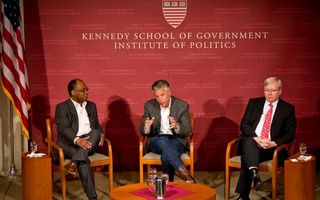A group of researchers at the Harvard School of Public Health have turned their focus to improving how hospitals communicate with their patients—including those who lack strong literacy skills.
The Health Literacy Studies groups, led by Rima Rudd as principal investigator, have produced a number of findings that tie adult literacy to health problems. Rudd outlined her findings in a perspective piece in the December issue of the New England Journal of Medicine.
“It’s time to look in the mirror and look at what it is that we are doing and what we are contributing to the information exchange to make sure we eliminate literacy related barriers,” Rudd said.
Rudd’s own work attempts to question many of the assumptions made by health care systems, hospitals, and health centers. She said she examines things as “simple” as a sign on the wall to things as “complicated” as forms and questionnaires.
“We have to pay attention to vocabulary, to the clarity of our thought, to avoiding jargon, to explaining complex mathematical terms like risk and normal and range,” Rudd said. “We don’t do a very good job with that.”
To study the barriers to navigating health care systems, Rudd devised a test to challenge the efficacy of hospital signs. An informant and an observer must find their way to a part of a hospital, such as a medical record room, and take note of all the things that led them there.
The results can be surprising, Rudd said, because even the most literate of people are unable to find directions to a certain area of a hospital.
Associate Professor Kasisomayajula “Vish” Viswanath also conducts research on health literacy. Institutions such as hospitals should be sensitive to the fact that they cannot just provide information, he said. They have to make sure it is comprehended by people in a way that they can use it.
“The information they are providing actually should take into account the needs of the patient,” Viswanath said.
“You have to really make accommodations on differences among people and how to really provide information taking into account those differences.”
The recently passed health care legislation attempts to address barriers to health literacy, Rudd said.
“There’s a lot of mention of the importance of explaining language, presenting things in plain language, and paying attention to literacy in writing and speaking,” Rudd said of health care reform legislation.
With health care information being distributed over a variety of mediums—electronically and in print—medical institutions must adjust their facilities to be accessible to all types of patients, Viswanath said.
“Health literacy is one of the ingredients that would help people cope with the explosion of information,” he said.
—Staff writer Melanie A. Guzman can be reached at melanieguzman@college.harvard.edu.
Read more in News
Dingman Hosts Cooking ClassRecommended Articles
-
No HeadlinePrinceton, it is said, is taking a decided brace in lacrosse. The team this year will be chosen from the
-
Broad Jumpers Make Good RecordsAs a result of the board-jump competition held underneath the Stadium yesterday afternoon, prospects in this event are much brighter
-
Forgetting Sarah MarshallYou can’t talk about producer Judd Apatow without bringing up his recent blockbusters “The 40-Year-Old Virgin” and “Knocked Up.” Apatow’s
-
"Role Models"In the raunchy opening minutes of “Role Models,” Danny (Paul Rudd) and Wheeler (Seann William Scott) chug energy drinks, verbally
-
 Huntsman, Rudd Discuss China's Rise
Huntsman, Rudd Discuss China's Rise -
Men’s Basketball Preview: VermontWith the rest of the College off for break, The Back Page is keeping up with the Harvard men’s basketball team as it wraps up its non-conference schedule. In the first in a series of previews of the squad’s upcoming match-ups, David Freed looks at what Vermont brings to the table.













